
The educational landscape is undergoing a profound transformation driven by the rapid advancement of technology. Digital transformation in education refers to integrating digital technologies into teaching and learning processes to enhance educational experiences and outcomes.
While this transformation holds immense promise for revolutionizing education, it also presents challenges that need to be carefully addressed to ensure its successful implementation.
In this article, let’s talk about the current state of digital transformation in the education sector: its benefits, trends, challenges, and best practices.
Digital Transformation in Education Case Studies
Agente is a trusted partner for institutions looking to apply advanced technology to enhance the educational process, streamline communication between educators and trainees, and improve the accessibility of educational content.
Our digital transformation experts offer extensive expertise in performing digital transformation in education along with a polished collaboration process that helps us guide our customers through digital transformation as seamlessly as possible.
Having worked with several higher education institutions over the years, we learned all the ins and outs of implementing technology in education for educational institutions and other organizations looking to streamline their training process.
Here, we would like to share examples of digital transformation in higher education projects our tech experts have delivered.
Automation Academy
Partnering with Workfusion, we revamped their digital academy that offers automation courses for enterprises, SMEs, and engineers. The courses provide valuable information on the implementation of Artificial Intelligence and smart automation techniques that help with enhancing operational efficiency for businesses of various fields.
Automation Academy had complicated user flows, which made navigating the software difficult for users. On top of that, the software was built on the Moodle platform, with preexisting layout restrictions.
Keeping that in mind, our team of PM and UI/UX designers were able to streamline the interface and alter the user flows, simplifying the overall experience. Our experts also adapted user-friendly designs to the Moodle platform and created a mobile version to facilitate accessibility.
LMS for Marketing Courses
Agente developers created an entire learning management system from scratch. The solution provides online marketing courses with video lessons, interactive tasks, performance assessments, and teacher-student communication tools.
Tech experts have started with the design architecture, making sure that the solution can be scaled to the client's requirements. Also, they enabled the future additions of new modules and categories.
Using the historical learning reports and business objectives, the developers were able to pinpoint and prioritize the required features and implement them into the solutions. Those features included video lessons, task management, progress tracking, performance assessment, messaging system, user profile, and analytics.
High School Website
Our engineers rebuilt the Citizens’ High School website which provides basic Math, English, Science, and Social Studies training. The client wanted to update the look of their website as well as make it more accessible and user-friendly.
To facilitate the client’s wishes, the Agente team reworked the navigation to make it more clear and more straightforward for users. With the new layout, finding any information doesn't take more than 2 clicks.
Our designers came up with an intuitive and responsive UI with clear accents and enhanced navigation. In addition, they also re-structured the course catalog, so that the users could find everything they need to know about a particular course and at the same time not get overwhelmed with new information.
Why Does the Educational Sphere Need Digital Transformation?
Digital transformation offers a plethora of benefits that can revolutionize the education sector.
As with any other business field, technology provides access to data insights that can empower efficient decision-making, improve access to information, and improve user retention with more engaging and interactive content.
Let’s take a look at some major benefits that highlight the importance of digital transformation in education.
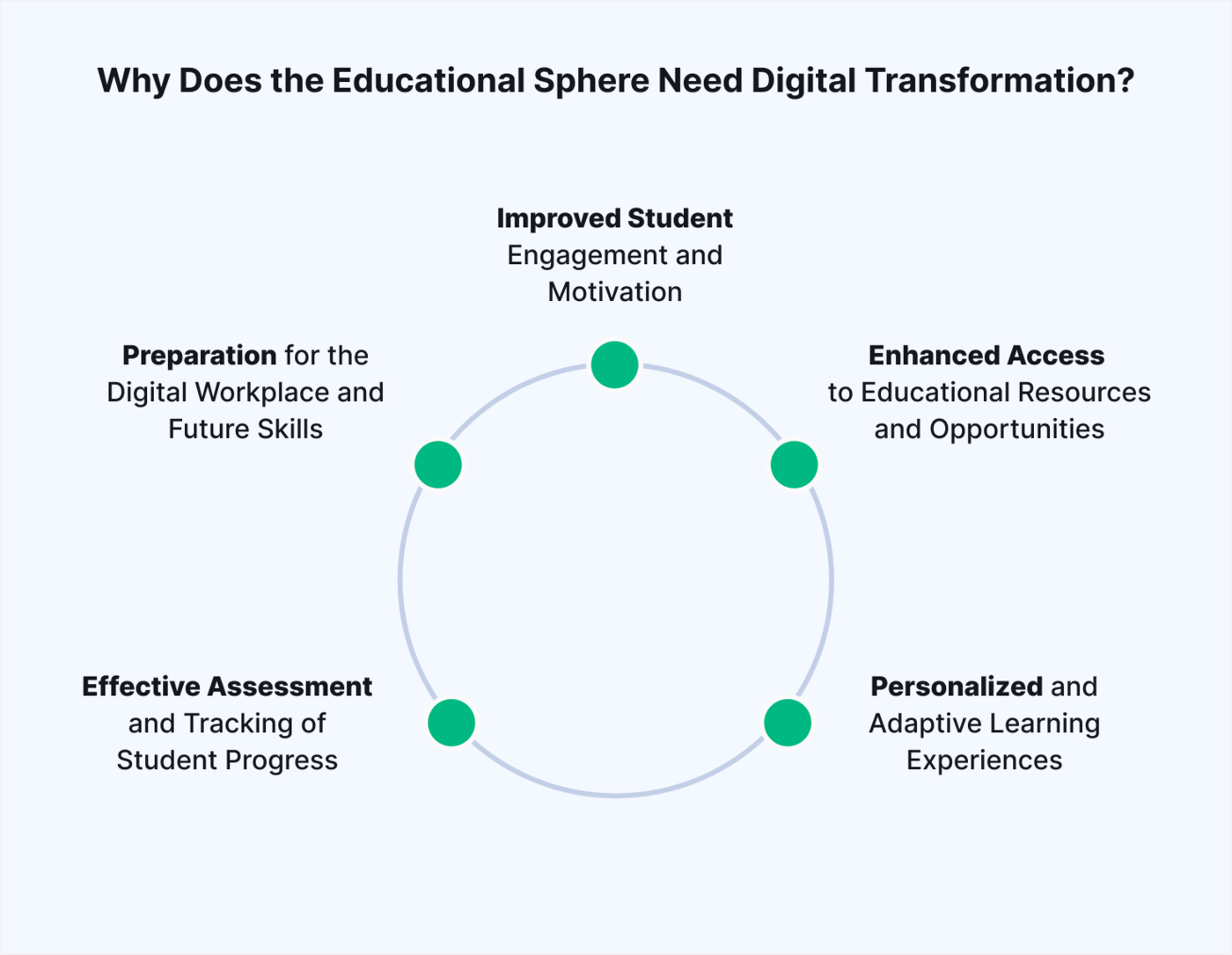
Improved Student Engagement and Motivation
Technology can make learning more interactive, engaging, and personalized. The interactive learning process increases student motivation, positively impacts participation rates, and leads to higher overall satisfaction with the learning process.
Technology offers ways to make learning more interesting to the students in the first place, which means they get more use out of it.
Enhanced Access to Educational Resources and Opportunities
Digital platforms provide access to various educational resources, including online courses, simulations, and interactive learning tools, regardless of location or socioeconomic status.
All it takes is a piece of hardware, like a smartphone or a laptop, and an internet connection. This increased access can help democratize education and bridge the opportunity gap, allowing more students access to high-quality educational content and professional guidance.
Personalized and Adaptive Learning Experiences
Technology can tailor learning experiences to individual student needs, preferences, and learning styles, providing personalized instruction and support.
This way, students can benefit from learning content recommendations, curriculum adjustments according to their performance, insightful progress assessments, and more.
The personalized approach offered by digital transformation in education leads to more effective learning and improved outcomes for all students.
Effective Assessment and Tracking of Student Progress
Digital tools enable real-time assessment and tracking of student progress, providing valuable insights to educators and parents for data-driven decision-making. This data-driven approach can help identify areas for improvement and personalize instruction accordingly.
Preparation for the Digital Workplace and Future Skills
Digital transformation equips students with the essential digital skills and competencies required for success in the 21st-century workplace and an increasingly digital world. These skills include digital literacy, critical thinking, problem-solving, collaboration, and communication.
Trends in Digital Transformation in Education
As digital transformation continues to evolve, various emerging trends are redefining how we learn, teach, and assess knowledge. The digital transformation trends in education, driven by technological advancements and pedagogical innovation, hold the potential to further enhance the overall experience for both students and teachers.
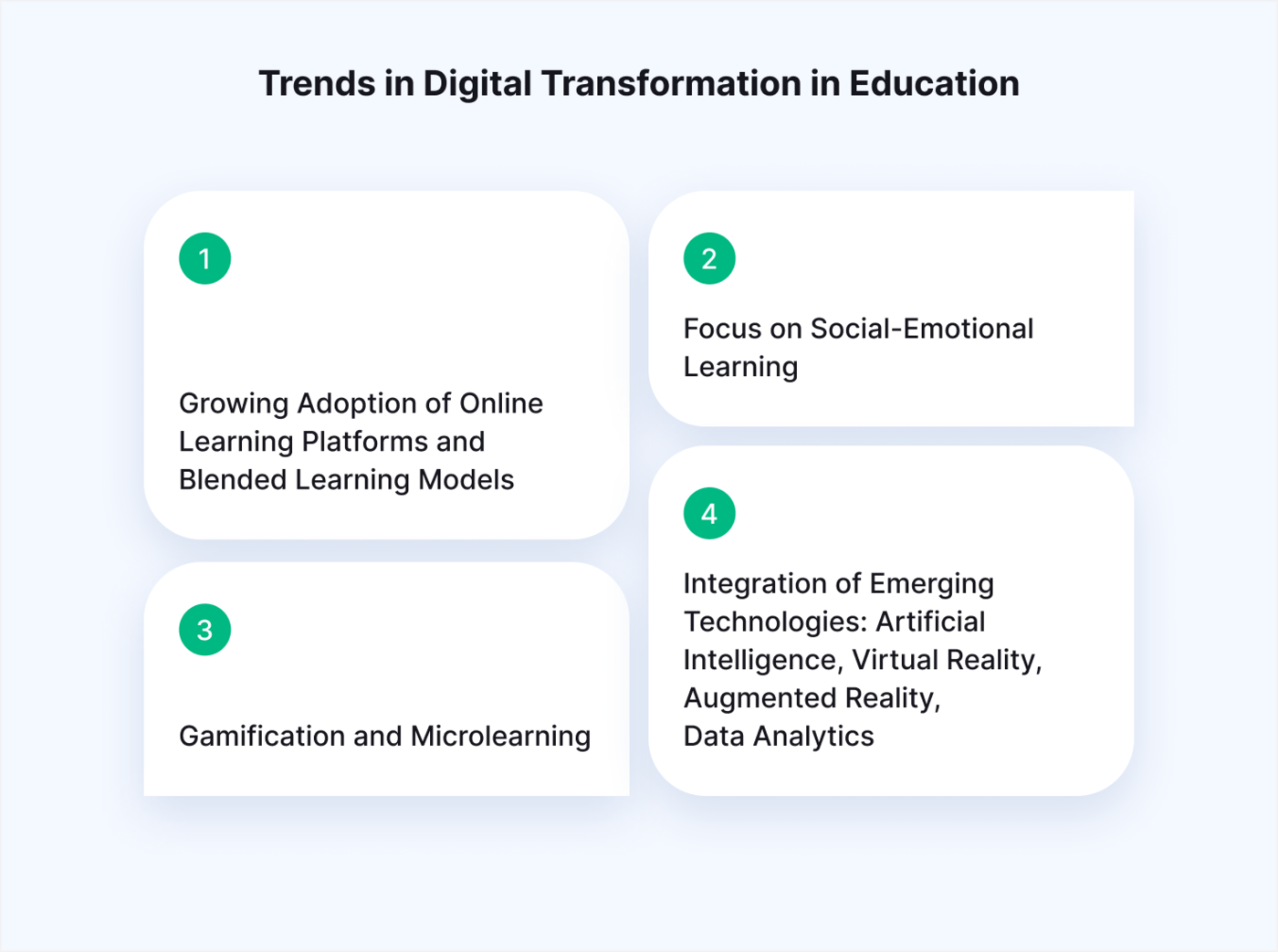
Growing Adoption of Online Learning Platforms and Blended Learning Models
Online learning platforms provide flexibility, accessibility, and self-paced learning opportunities, while blended learning models combine traditional classroom instruction with online elements.
Educators can harness the power of online learning platforms to support their in-class learning activities and do away with boring homework assignments. For example, video lessons and interactive quizzes can make learning more engaging in the classroom, while the same educational content can be used for homework purposes.
Digital technology also facilitates collaboration, providing students with the tools to learn together effectively.
On the other end of the deal, online tests can offer teachers an insight into how well students understand the topics discussed during classes.
Gamification and Microlearning
The integration of game-based learning elements into the educational landscape is gaining significant momentum. This approach leverages the inherent motivational power of game design to captivate students' attention and solidify their understanding of key concepts.
By incorporating elements such as points, badges, leaderboards, and engaging narratives, gamified learning environments transform knowledge acquisition into a dynamic and rewarding experience. This fosters a deeper engagement with the material, promoting active learning and encouraging students to persevere through challenges.
Focus on Social-Emotional Learning
A plethora of innovative tools and resources are emerging that provide educators with effective platforms to support the development of crucial social-emotional skills.
These tools can foster self-awareness by offering personalized feedback and reflective exercises, aiding students in understanding their strengths, weaknesses, and emotional landscapes. Additionally, technology can cultivate empathy and encourage responsible online interactions through collaborative learning platforms and simulations that promote respectful communication and conflict resolution.
Integration of Emerging Technologies
Emerging technologies like artificial intelligence, virtual and augmented reality (AR), and data analytics are transforming teaching and learning in their own way:
- AI: AI-powered tools enable personalized learning, intelligent tutoring systems, and adaptive assessments, providing individualized instruction and support.
- VR: VR creates immersive learning experiences, simulations, and virtual field trips, enhancing engagement, understanding, and conceptual learning.
- AR: AR overlays digital content onto the real world, providing interactive textbooks, hands-on learning experiences, and enhanced visualization of complex concepts.
- Data Analytics: Data analytics helps identify student strengths, weaknesses, and areas for improvement, informing personalized instruction, curriculum development, and resource allocation.
The Challenges of the Digital Transformation in Education
Despite the optimistic promises of digital transformation, a journey of change is seldom without its challenges. As educators and institutions embark on this transformative path, it's crucial to acknowledge and address the potential obstacles that may arise.
These challenges encompass disparities in access, skills, resources, and the protection of sensitive data, underscoring the need for a thoughtful and multi-faceted approach to implementation.
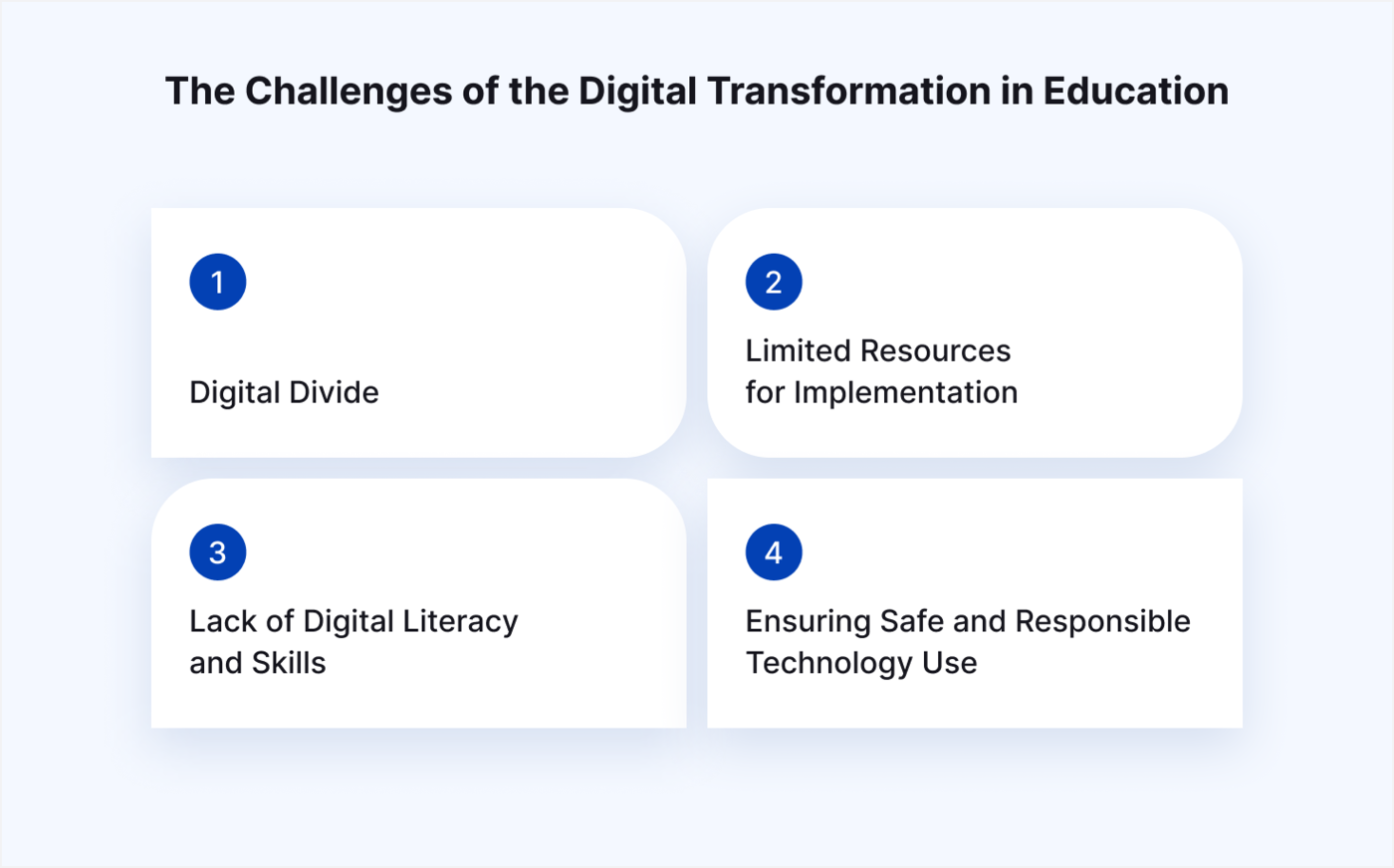
Digital Divide
Socioeconomic disparities and limited access to technology and connectivity create a digital divide, hindering access to digital resources and opportunities. This divide can exacerbate existing educational disparities.
Lack of Digital Literacy and Skills
Varying levels of digital literacy and skills among educators and students can interfere with the effective integration of technology into teaching and learning. Addressing this skills gap is crucial for successful digital transformation.
Limited Resources for Implementation
Implementing digital transformation approaches often requires significant financial investments and may strain school budgets. Resource allocation and strategic funding are essential to ensure effective implementation.
Data Security and Privacy Concerns
Protecting student data from unauthorized access and breaches is also important. Robust cybersecurity measures, data governance policies, and parent-teacher communication are essential to safeguard student privacy.
Ensuring Safe and Responsible Technology Use
Monitoring and managing technology use in schools is essential to ensure a safe and responsible learning environment. Establishing policies and guidelines for technology use, addressing potential risks, and promoting digital citizenship are crucial.
Best Practices for Implementing Digital Transformation in Education
To ensure a successful digital transformation journey in education, adopting a holistic approach that addresses technological integration, educator training, resource allocation, data utilization, and risk mitigation is crucial.
Here are some best practices to guide educators and educational institutions in their digital transformation endeavors:
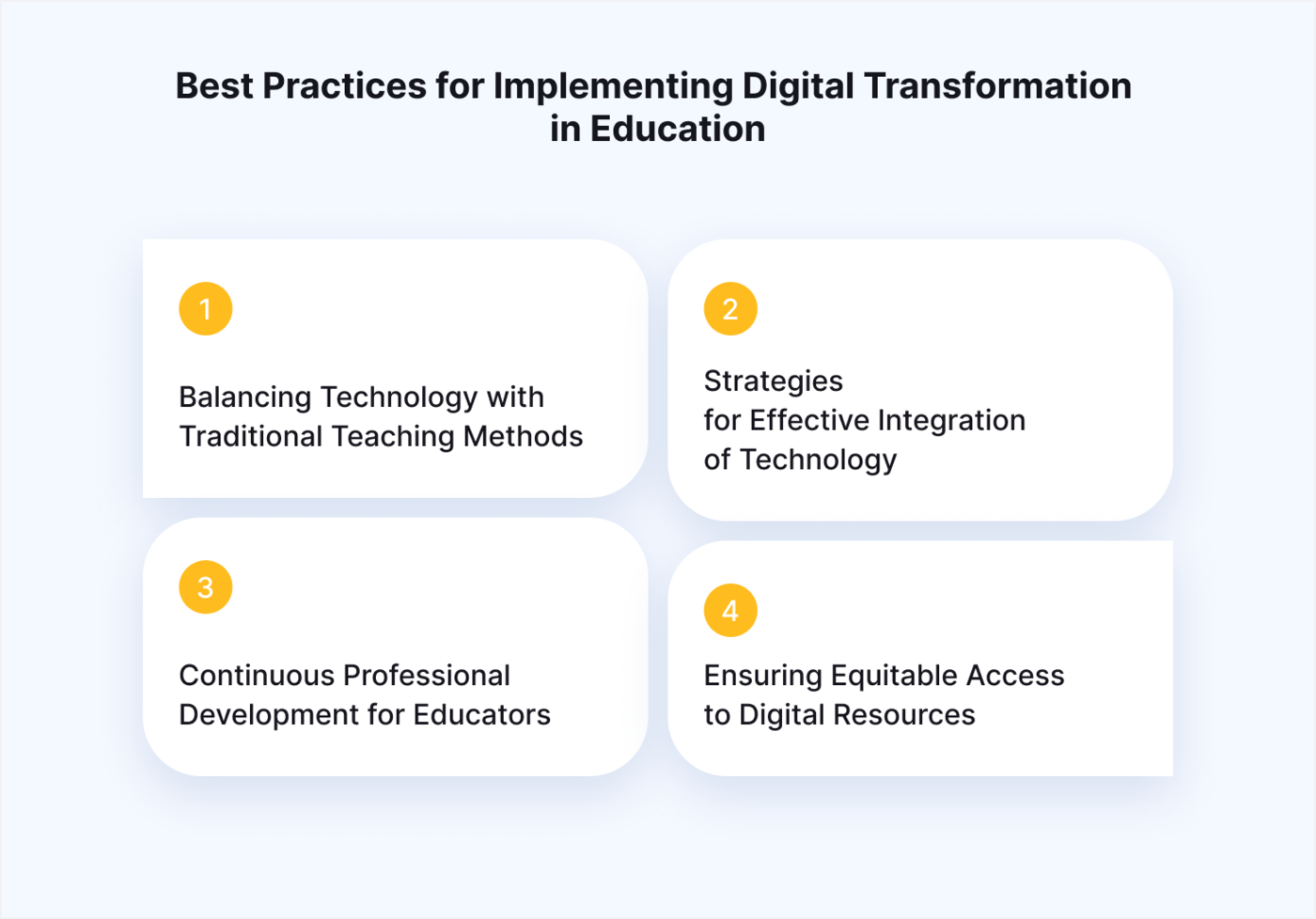
Strategies for Effective Integration of Technology
Develop strategies for integrating technology into teaching and learning, aligning technology use with pedagogical goals, student needs, and curriculum objectives. It will help to properly prioritize the choice of features and not to overspend on unrequited functionality.
Balancing Technology with Traditional Teaching Methods
Strike a balance between technology and traditional teaching methods, leveraging technology to enhance already existing teaching practices. A sound educational process is the base for effective learning, and technology must complement and support it.
Ensuring Equitable Access to Digital Resources
Address the digital divide by providing equal access to technology and digital resources for all students, regardless of background or location. This may involve infrastructure investments, device provisioning, and targeted support for less fortunate communities.
Continuous Professional Development for Educators
Provide ongoing professional development for educators to build their digital literacy skills and pedagogical approaches for technology-enhanced learning. Professional development should be tailored to the specific needs of educators and aligned with the school's digital transformation. In other words: the teachers must know how to use the technology to effectively improve the way they teach.
Bottom Line
Digital transformation in education is not merely a technological shift but a paradigm shift in how we approach teaching, learning, and preparing students for the future. By addressing the challenges, embracing best practices, and fostering a culture of collaboration and continuous improvement, we can harness the power of technology to revolutionize education, empower learners, and shape a brighter future for all.
Rate this post!
8 ratings, average ratings is 1.0 out of 5
Frequently asked questions
Whether you represent a private business, a large enterprise or an educational institution, our e-learning platform development services will greatly improve the performance of your company.
What are some examples of digital transformation in education?
Some examples of digital transformation in education include online learning platforms like MOOCs, the use of AI for personalized learning and adaptive assessments, and immersive learning experiences through VR and AR technology. These advancements enhance access, personalize learning, and prepare students for the future digital workplace.
What will be popular in digital transformation in education in the future?
The future of digital transformation in education promises even more exciting and impactful advancements. The emerging trends include personalized learning, improved immersion with AR/VR, gamification, and increased focus on social-emotional learning.
What are the most important areas in the digital transformation of education now?
Among critical areas in digital transformation are bridging the gap between the digital divide, which means making technology equally accessible; equipping educators, so they could benefit from the full potential of digital learning; personalizing training to offer students unique learning experiences; and protecting students' data from unauthorized access.
Related Posts

19 January 2024
AI Model Fine-Tuning: How to Use Your Organization's Data?
Organizations are transitioning from generic solutions to hyper-customized intelligence, seeking AI models designed to address their unique challenges and propel them toward strategic objectives.
This demand has propelled fine-tuning to the forefront of AI development.
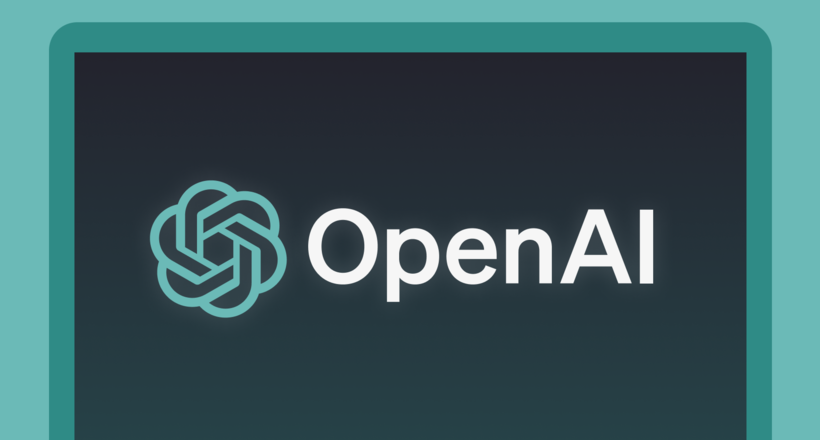
16 January 2024
ChatGPT Plugin Development: Features and Benefits for Business
Explore the process of crafting a ChatGPT plugin tailored precisely to meet your unique business requirements.

09 May 2024
Top 7 Open-Source LLMs for 2024
Here, we break down everything you need to know about open source LLM models: top 7 offerings on the market, their pros, cons, and capabilities.

07 May 2024
What are large language models: a complete guide
Get your large language model definition straight: in this article, we cover the concept of LLMs, their capabilities, types, and challenges.
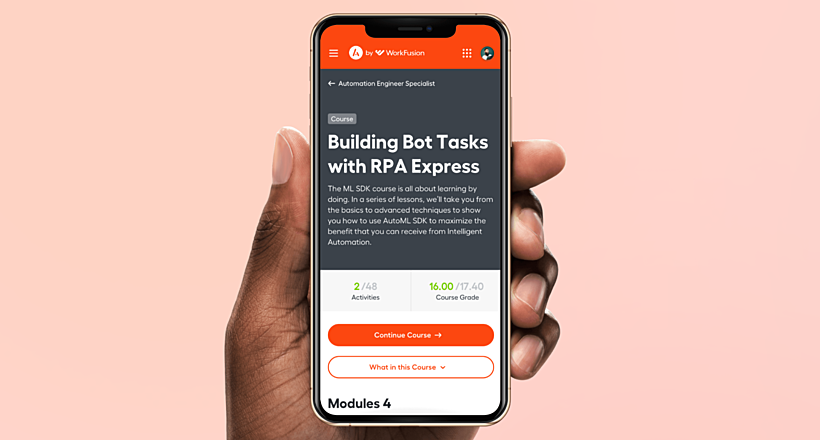
Develop Custom Corporate Microlearning Platform
Custom microlearning solutions for corporate training: Discover how to develop a tailored platform for efficient and engaging employee learning

24 January 2024
Employee Training Management Software Development in 2024: Features and Cost
Streamline your employee training with cutting-edge software solutions. Explore the features and costs of employee training management software.
Let's talk
Is there a challenge your organization or company needs help solving? We’d love to discuss it.

Managing Director, Partner
Andrew Terehin

Thank You!
Your message has been successfully sent.
We will contact you very soon.





